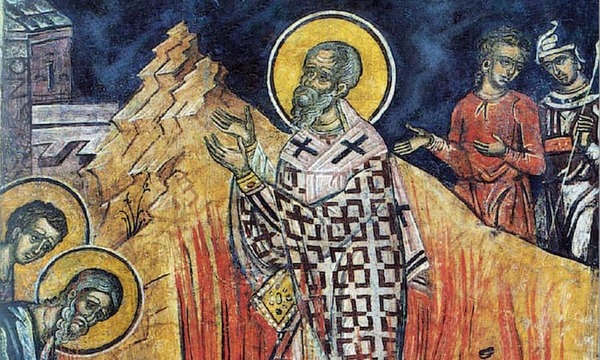In a former post, I tried to answer the question of whether Paul was a literal tentmaker. In this post, I ask whether Paul was a figurative tentmaker — one who was self-supporting in ministry.
I often interact with Christians who say, “I want to be tentmaker like Paul.” What they mean is that they want to do active ministry (usually overseas missions, or occasionally local church planting), but don’t want to receive financial support to do it. They want simultaneously to engage in ministry and to work another job to support themselves.
This goal is laudable, and “tentmakers” of this sort have been vital in the work of spreading the gospel and building churches throughout history.
But was Paul himself this kind of “tentmaker”? It appears that sometimes he was, and sometimes he was not. Let me offer some biblical evidence that he sometimes supported himself (was a metaphorical tentmaker) followed by evidence that he sometimes did not.
Evidence that Paul sometimes supported himself — and even refused to receive financial support:
Paul’s ministry in Thessalonica and Corinth offer the chief examples of Paul being self-supporting.
In Thessalonica: “Remember, brothers, our labor and toil: we worked night and day, that we might not be a burden to any of you, while we proclaimed to you the gospel of God.” (1 Thess. 2:9)[1]
In Thessalonica: “For you, yourselves know how you ought to imitate us, because we were not idle when we were with you, nor did we eat anyone’s bread without paying for it, but with toil and labor we worked night and day, that we might not be a burden to any of you.” (2 Thess. 3:7-8)
In Corinth: “And he [Paul] found a Jew named Aquila, a native of Pontus, recently come from Italy with his wife Priscilla, because Claudius had commanded all the Jews to leave Rome. And he went to see them, and because he was of the same trade he stayed with them and worked, for they were tentmakers by trade.” (Acts 18:2-3)
In Corinth: “Or is it only Barnabas and me who have no right to refrain from working for a living?… If we have sown spiritual things among you, is it too much if we reap material things from you? If others share this rightful claim on you, do not we even more? Nevertheless, we have not made use of this right, but we endure anything rather than put an obstacle in the way of the gospel of Christ… What then is my reward? That in my preaching I may present the gospel free of charge, so as not to make full use of my right in the gospel.” (1 Cor 9:6, 11-12, 18)
In Corinth: “Or did I commit a sin in humbling myself so that you might be exalted, because I preached God’s gospel to you free of charge?” (2 Cor 11:7)
Evidence that Paul sometimes received financial support to do his ministry:
The evidence that Paul sometimes received financial support relates especially to monies received from Macedonia, that is, from Philippi for sure, and perhaps also from Thessalonica and Berea or other churches which were in or near Macedonia.
From Macedonia: “And you Philippians yourselves know that in the beginning of the gospel, when I left Macedonia, no church entered into a partnership with me in giving and receiving, except you only. Even in Thessalonica, you sent me help for my needs once and again. Not that I seek the gift, but I seek the fruit that increases your credit. I have received full payment, and more. I am well supplied, having received from Epaphroditus the gifts you sent, a fragrant offering, a sacrifice acceptable and pleasing to God.” (Phil 4:15-18)
From Macedonia: “I robbed other churches by accepting support from them in order to serve you. And when I was with you and was in need, I did not burden anyone, for the brothers who came from Macedonia supplied my need. So I refrained and will refrain from burdening you in any way.” (2 Cor 11:8-9)
From Macedonia: “But when Silas and Timothy came down from Macedonia, Paul began devoting himself completely to the word, solemnly testifying to the Jews that Jesus was the Christ.” (Acts 18:5 NAS)
In other words, in Paul’s ministry in Thessalonica and Corinth (and probably other places where he sought to establish new churches), he tried not to confuse the mission and to burden new converts by asking for money, and thus either worked with his own hands to pay his way or received money from a distant church to supply his needs. (The scenario of the Macedonians sending money in 2 Cor 11:8-9 also raises the possibility that we should understand Acts 18:5 to mean that when Silas and Timothy came down from Macedonia, “Paul began devoting himself completely to the word,” [as NAS translates it] since they probably brought a money gift, rather than that, “Paul was occupied with the word” [as ESV translates it]).
So, was Paul a metaphorical “tentmaker”? That is, did Paul work to cover his expenses?
Sometimes yes, and sometimes no.
See my previous post: Was Paul a Tentmaker? Part 1: Did Paul Make Literal Tents?
This post and other resources are available at Kindle Afresh: The Blog and Website of Kenneth Berding.
Notes:
[1] All quotations are from ESV unless otherwise indicated.
 Biola University
Biola University




